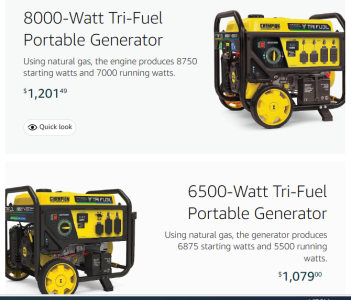We have a smallish gas generator. Would like to get a smallish battery/ solar one. I’m looking at a few that are in the 1000 -1200 watt range. And can be expanded. Aside from cost, weight is also an issue. These seem to be in the 35 - 40 pound range, not including extra pack. That’s about my limit.
Sometimes we lose power for a few hours, something we can just plug into would be great for short term use. The big issue with gas generator is dealing with the cords from it to appliances since you can’t have it too close to house. And we hardly ever lose power on a nice sunny day. Dealing with gas generator during a rain storm isnt fun.
Sometimes we lose power for a few hours, something we can just plug into would be great for short term use. The big issue with gas generator is dealing with the cords from it to appliances since you can’t have it too close to house. And we hardly ever lose power on a nice sunny day. Dealing with gas generator during a rain storm isnt fun.
